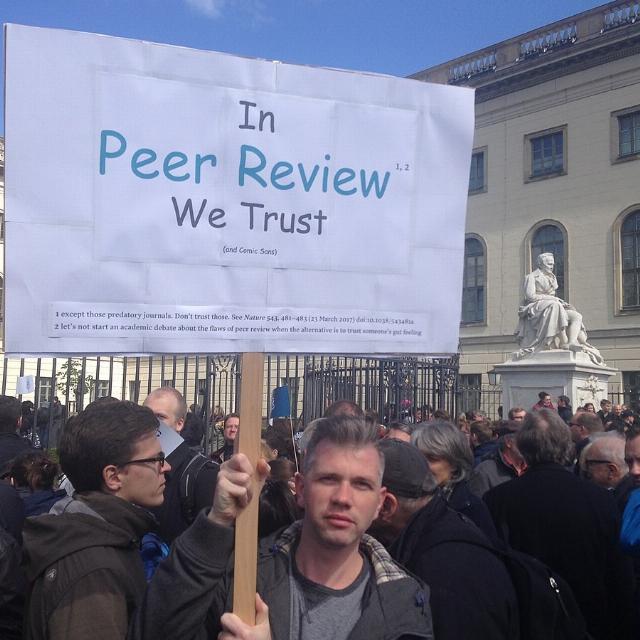Peer review needs peer review
Here’s Senator Rand Paul being interviewed on Fox News in May 2021:
Dr. Shi the ‘bat scientist’ -- that’s the most famous one from the Wuhan Institute -- when she published her papers, which scientists across the board are saying are gain of function, they were juicing up viruses -- she gave credit to Dr. Fauci. She said the funding came from -- we have this in black and white from a peer-reviewed journal: She said the funding came from Dr. Fauci’s National Institute, NIAID. This is Dr. Fauci’s baby for 40 years. She lists him in the credits. He can’t escape this. He did the funding.
Note Senator Paul’s reference to a peer-reviewed journal, the implication being that, unlike from a non-peer-reviewed source, where anything can be made up, claims were checked and presumably accurate. But is this so? A very interesting article appearing on May 17, 2024 in Country Squire magazine, and copied here, gives the historical origins of peer review, which is where the editor of a journal forwards an article for review by independent researchers, with the feedback returned to the editor who has final say.
Peer review has evolved into a system where a science paper -- no matter how solid and impeccable -- not following the narrative or consensus is likely to get rejected. We witnessed this during COVID-19, where papers on therapeutic drug efficacy, vaccine side effects, deleterious effects of lockdown, etc., were rejected by the more prominent journals (including the most prestigious ones such as the Lancet and the New England Journal of Medicine) simply for not following the narrative, while junk papers following the narrative were accepted in record time. We’ve seen the same thing with climate change, which allowed Barack Obama to cite a fake figure of a 97% consensus in the field. We’ve seen it with journals covering transgender issues, where papers about how social media influence affects the transgender population rate or the harms of gender-affirming surgery are likely to get rejected by journals or even pulled after publication due to woke pressure. It has also come to light that Anthony Fauci at NIH/NIAID was in control of much of the nation’s health care research funding. So even if a prominent epidemiologist or virologist not following the narrative gets published, he/she might be deprived of funding -- a death sentence for most.
Peer review is not infallible -- I can tell you this from my own experience with published journal articles. The reviewers, who are usually university professors or those working in professional labs, have a day job with higher priority, and unlike our impression of them analyzing and verifying every line, may not catch every mistake. The authors still bear most of the responsibility to get it right. In what may be a Catch-22 of sorts, only after you get published does it get easier to get published again since you’re now “established.” And reviewers have their biases.
These flaws may not change the fact that peer review is better than anything else. The problem is when peer review, and/or political bias by or pressure on the journal editor, is used to control the narrative. This has become a major problem. It has made “Follow the Science” a dark joke.
So what can be done? Maybe the current journals which have damaged their reputations will need to widen their horizons and accept papers contrary to the narrative, as well as seek true independent peer review. Or maybe, as with media, the mainstream of which can’t be fixed, perhaps what is needed is new, “conservative” journals, with “conservative” peer review, which will gain prominence over time. Or maybe we need alternative journals offering a venue to publish papers with controversial results, but somehow avoiding the fate of Peter Duesberg who, writing in 2009 in the Elsevier publication Medical Hypotheses, contested the narrative of an HIV basis of AIDS. The NIH (not Republicans!) pounced, threatening to remove all Elsevier articles from the National Library of Medicine unless the paper was withdrawn and the usual peer review instituted, and the publisher caved (including firing the editor). Maybe the key is that politicians (like Donald Trump?) need to change the way NIH does business. Let’s acknowledge the problem, then work on a fix.
W.A. Eliot is a pseudonym

Image: Sarahmirk
FOLLOW US ON
Recent Articles
- New York Greenlights Quarantine Camps
- Reality Check for Democrats
- A MAGA Siege of the Democrats’ Deep State
- Why Incel and 4B Culture Matter
- Defending Donald Trump: A Response to Jeffrey Goldberg and The Atlantic on the Signal Leak
- Are Judges Complicit in Lawfare?
- Deep Dive: The Signal Chat Leak
- Mark Steyn’s Reversal of Fortune
- Where We Need Musk’s Chainsaw the Most
- Trump Is Not Destroying the Constitution, but Restoring It
Blog Posts
- Consumer Sentiment Survey: This too shall pass
- If they only had knife control....
- Newsom and Walz struggle to appear normal
- Anti-Trump lawfare: yes, it's a conspiracy
- Criminal attack? You're on your own.
- Amid disaster, watch Bangkok clean up and rebuild
- Katherine Maher shoots herself, and NPR, in the foot
- A visit to DOGE
- You just might be a Democrat if ...
- Yahoo Finance writer says Trump’s tariffs will see America driving Cuban-style antique cars
- Kristi Noem and the prison cell
- Dividing the Democrats
- April 2nd: Liberation Day and Reconciliation Day don’t mix
- Red crayons and hospital gowns
- The Paris Climate Agreement was doomed from the start






